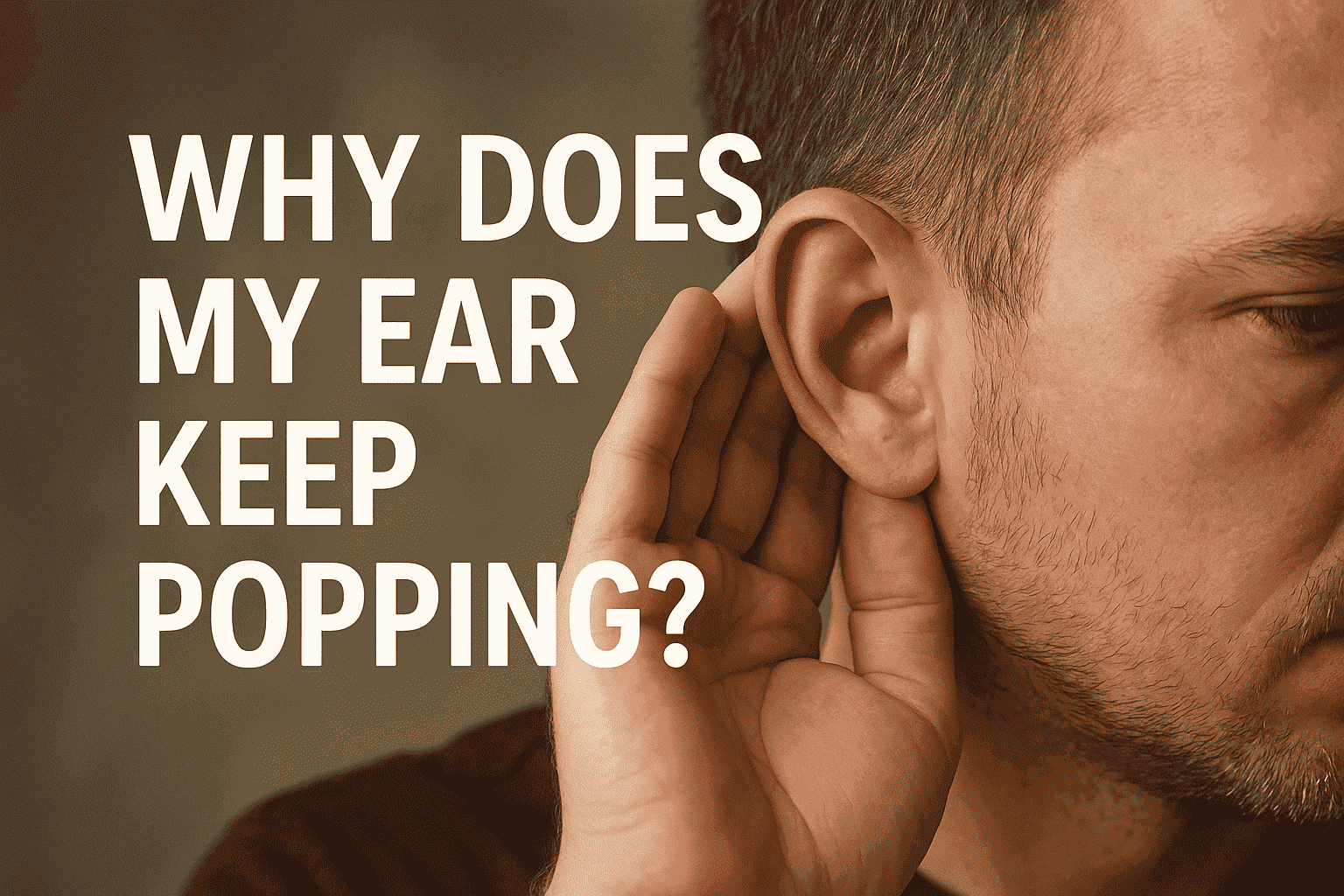Table of Contents
If you’ve ever experienced sudden ear popping, you know how distracting and sometimes uncomfortable it can be. This common phenomenon can happen for various reasons, from changes in air pressure to underlying medical conditions. Understanding why your ears keep popping is important for identifying potential issues and finding effective solutions.
In this guide, we’ll cover causes, symptoms, when to seek medical advice, and treatments for ear pressure, popping and constant popping in the ears.
What Causes Ear Popping?
Ear popping occurs when the pressure inside your middle ear changes relative to the outside environment. The Eustachian tube, a small canal connecting the middle ear to the back of the nose and throat, plays a critical role in regulating this pressure.
When the Eustachian tube does not open or close properly, pressure differences cause your ear to pop, crackle, or feel full. Common causes include:
- Altitude Changes – Rapid changes during air travel, driving in mountains, or elevators can trigger ear pressure popping.
- Colds and Sinus Infections – Congestion can block the Eustachian tube, making it harder to equalize pressure.
- Allergies – Swelling and inflammation can prevent proper air flow, resulting in crackling in the ear.
- Earwax Buildup – Excess wax can trap air and cause the sensation of popping.
- TMJ Disorders – Jaw misalignment can affect the middle ear and create frequent popping sounds.
Understanding the Eustachian Tube
The Eustachian tube is essential for maintaining pressure balance in the ear. It opens when you swallow, yawn, or chew, allowing air to flow in and out of the middle ear.
When the tube is blocked or malfunctioning, you may experience:
- Constant popping
- Ear fullness or pressure
- Muffled hearing
- Crackling in the ear
Persistent issues with the Eustachian tube can lead to chronic discomfort or recurrent infections. If your ear keeps popping regularly, a visit to a healthcare professional is recommended.
Symptoms Associated with Ear Popping
While ear popping is often harmless, certain accompanying symptoms may indicate an underlying problem:
- Ear pain or discomfort
- Hearing loss or muffled hearing
- Tinnitus (ringing in the ear)
- Dizziness or balance issues
- Fluid or pressure buildup in the ear
Recognizing these signs can help determine whether simple home remedies are sufficient or if medical evaluation is necessary.
How to Relieve Ear Popping
There are several safe and effective methods to relieve ear popping and restore normal pressure:
- Swallowing or Yawning: These natural movements help open the Eustachian tube, allowing air to flow and equalize pressure. Try swallowing repeatedly or yawning slowly if you feel a sudden pop or fullness in the ear.
- Chewing Gum or Sucking Candy: The repeated motion of chewing or sucking encourages the Eustachian tube to open, reducing crackling in the ear. This method is especially helpful during flights or when driving through hilly areas.
- Valsalva Maneuver: Gently pinch your nose, close your mouth, and blow softly. This can help balance the pressure inside your middle ear. Always avoid forceful blowing, as too much pressure can cause damage or discomfort.
- Nasal Decongestants: Over-the-counter decongestants or antihistamines can reduce swelling in the nasal passages and help open the Eustachian tube. These are particularly useful during colds, sinus infections, or allergy flare-ups.
- Ear Drops: If earwax buildup is contributing to the popping, safe ear drops or professional ear cleaning can help remove excess wax and relieve pressure. For proper guidance, you can learn more about safe ear care and testing at The Hearing Centre.
When to See a Doctor
While occasional ear popping is normal, seek professional evaluation if you experience:
- Persistent or constant popping
- Pain, swelling, or discharge
- Hearing loss or tinnitus
- Dizziness or imbalance
- Recurring ear infections
An audiologist or ENT specialist can perform tympanometry, pure-tone audiometry tests, or other assessments to identify underlying problems.
Ear Popping and Hearing Health
Frequent ear popping can sometimes indicate conditions that affect long-term hearing, such as chronic Eustachian tube dysfunction, fluid buildup, or infections. Timely evaluation ensures your hearing is examined, protected, and any necessary interventions, including hearing aids, can be considered.
Tips for Preventing Ear Popping
- Avoid rapid altitude changes when possible.
- Treat allergies and sinus infections promptly.
- Keep nasal passages clear and hydrated.
- Maintain regular ear checkups to monitor ear pressure and popping issues.
Conclusion
Experiencing ear popping is common, but frequent popping can signal underlying issues with the Eustachian tube, sinus health, or earwax buildup. Simple remedies such as swallowing, yawning, or gentle pressure equalization can help in most cases. However, if symptoms persist, professional evaluation is essential to protect hearing health and prevent complications. Clinics like The Hearing Centre offer comprehensive ear assessments, hearing tests, and solutions to ensure your ears remain healthy and comfortable.
Frequent popping may be due to Eustachian tube dysfunction, sinus issues, allergies, or earwax buildup.
Not always. Occasional popping is normal, but persistent symptoms could indicate underlying conditions affecting hearing.
Yes. Congestion can block the Eustachian tube, leading to ear pressure popping and muffled hearing.
Swallowing, yawning, chewing gum, or using a gentle Valsalva maneuver can help equalize pressure.
Yes. Inflammation from allergies can block the Eustachian tube, causing repeated crackling in the ear.
Yes. Asymmetry in Eustachian tube function or blockages can cause one ear to pop more frequently.
Yes. Wax buildup can trap air and create the sensation of fullness or popping.
If you experience pain, hearing loss, dizziness, fluid discharge, or persistent popping, consult an audiologist or ENT.
Occasional popping is harmless, but chronic pressure issues or untreated infections could lead to long-term problems.
Yes. Tests like tympanometry or pure-tone audiometry can assess middle ear function and identify the cause.

Evlin is passionate about helping people with hearing loss. With years of experience in audiology, she has diagnosed and treated a wide range of hearing conditions across all age groups. She is accredited to conduct comprehensive hearing assessments and provide treatments for patients from newborns to the elderly. Committed to personalized care, she strives to empower patients to fully engage in life with better hearing.
Designation: Clinical Audiologist
Qualification: Bachelor of Health Science (Honours) (Audiology), University of Science Malaysia
Membership: .Society of Audiology Professionals in Singapore (SAPS)
